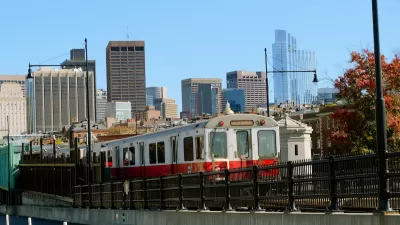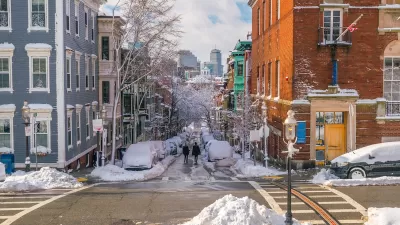Acorn Street in Boston has been described as the nation's most photographed street, and now residents who live on the private way are pushing for controls on the number of people visiting the narrow, cobblestone street.

Steve Aneear reports from the nation's most photographed street: Acorn Street in Boston.
OK, there's no official data backing up that claim, but "some say" that it's the most photographed street in the United States, and we'll go with that as long as we can bring a big bag of salt along with us.
Regardless of the veracity of the claim, there are plenty of lessons to appreciate in the conduct of humanity enabled by technology along this narrow thoroughfare in Boston, lined by million dollar homes, a stone road, kissing couples, and Instagram influencers.
"Acorn Street, which was laid out in 1823, has long been a must-see spot for tourists from as far away as China and as close by as Cambridge," writes Aneear. "It’s featured on JetBlue’s website, and a picture of it greets travelers arriving at Logan Airport. Tour companies promote it to customers as a place to check out while in town."
"A quick scan through Instagram shows couples kissing in the road, barefoot dancers hanging from the lamp posts, and strangers sprawled out on doorsteps and smiling between decorative gourds."
Now a neighborhood organization called the Acorn Street Association, originally formed to prevent the city from paving over the cobblestone street, is pushing back on the hordes of tourists visiting the street. As a private way, residents along the street have a lot more power to block access than they would on publicly owned and maintained thoroughfares.

Maui's Vacation Rental Debate Turns Ugly
Verbal attacks, misinformation campaigns and fistfights plague a high-stakes debate to convert thousands of vacation rentals into long-term housing.

Planetizen Federal Action Tracker
A weekly monitor of how Trump’s orders and actions are impacting planners and planning in America.

San Francisco Suspends Traffic Calming Amidst Record Deaths
Citing “a challenging fiscal landscape,” the city will cease the program on the heels of 42 traffic deaths, including 24 pedestrians.

Defunct Pittsburgh Power Plant to Become Residential Tower
A decommissioned steam heat plant will be redeveloped into almost 100 affordable housing units.

Trump Prompts Restructuring of Transportation Research Board in “Unprecedented Overreach”
The TRB has eliminated more than half of its committees including those focused on climate, equity, and cities.

Amtrak Rolls Out New Orleans to Alabama “Mardi Gras” Train
The new service will operate morning and evening departures between Mobile and New Orleans.
Urban Design for Planners 1: Software Tools
This six-course series explores essential urban design concepts using open source software and equips planners with the tools they need to participate fully in the urban design process.
Planning for Universal Design
Learn the tools for implementing Universal Design in planning regulations.
Heyer Gruel & Associates PA
JM Goldson LLC
Custer County Colorado
City of Camden Redevelopment Agency
City of Astoria
Transportation Research & Education Center (TREC) at Portland State University
Jefferson Parish Government
Camden Redevelopment Agency
City of Claremont





























